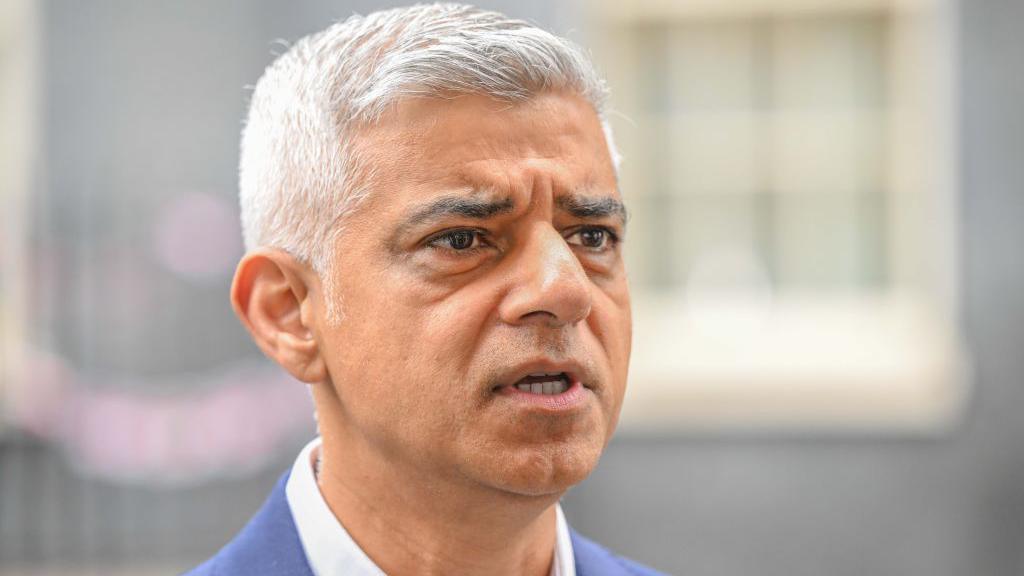'Justice system complicit in stalking escalation'

Claire Waxman says stalking victims have been "failed for too long"
- Published
The criminal justice system is failing stalking victims, a review by London's victims' commissioner has found.
Claire Waxman's review found that two-thirds of stalking offences in London are committed by repeat offenders.
"The system has become complicit in allowing stalking cases to escalate," she said.
Jess Phillips, the new safeguarding minister, said the Home Office would treat violence against women as "the national emergency that it is".
The stalking review , externalis the first by the Mayor’s Office for Policing and Crime (Mopac) under the direction of the victims' commissioner.
The report was commissioned specifically to investigate the Metropolitan Police's response to stalking in London.
Ms Waxman said 45% of stalking victims withdrew from the justice process and a further 41% saw no further police action on their complaints, according to her findings.
She told BBC London: "It's a near total failure to tackle stalking and, when we don't tackle it, we're actually leaving victims at risk and enabling stalkers to continue."
She added police forces nationally often failed to act on complaints until "something bad" had happened.
Her report found there was "confusion" in the Metropolitan Police and wider justice system about anti-stalking laws".
It goes on to say: "Confusing legislation is hampering the police’s ability to build strong cases, enabling stalkers to act with impunity and leaving victims at risk."

Stalking victim Emma Davey said police did not initially act on her complaints
Emma Davey told BBC London she was stalked and harassed for three years by her ex-partner after she ended their relationship.
"It started with writing on all social media platforms under fake accounts, slandering my name, trying to make me feel very, very uneasy.
"Even though I had left him, he was still trying to control my life," she said.
He later put a tracker on her car and even threatened to employ someone to follow her as she moved abroad.
Although her stalker was eventually convicted, Ms Davey said police initially told her case lacked evidence.
"One police officer even said 'when he does something - then we can take action'," she said.
Ms Davey told BBC London she later developed an app designed for stalking victims to record a log of incidents that they could present to police.
'Need for reform is clear'
One in five women and one in 10 men in the UK have been victims of stalking, according to the report.
The report said stalking was often mis-recorded by the police because officers were unable to identify stalking behaviours, their escalation and the risk they posed to victims.
Cdr Kevin Southworth, the Met's public protection lead, said the force welcomed the report's findings and recognised the need for change.
"The Met is transforming the way it protects the public from harm, better targeting predatory offenders and identifying stalkers as early as possible," he said.
The review has made 13 recommendations to the Met, the government and Mopac to overhaul the justice system's response to stalking.
Victim stalked for 19 years insulted by sentence
- Published2 November 2022
Real life Baby Reindeer victims urged to speak out
- Published29 April 2024
Stalkers to be tagged under new scheme
- Published10 May 2018
Among them is a campaign to raise awareness of the behaviours that constitute stalking.
The report also urged the government to look at establishing a stand-alone offence of stalking that "provides a clear definition of stalking to... remove the onus on the victim to prove the impact".
It also recommends that the Met and Mopac "deliver a victim care hub in London to ensure victims have a dedicated, highly trained advocate".

Sadiq Khan says stalking is "one of the worst examples of predatory behaviours"
London Mayor Sadiq Khan said the justice system must "radically change to stop the cycle of reoffending and make London safer for everyone".
The safeguarding minister said the government would "drastically improve" the police and criminal justice system's response to stalking.
"This includes strengthening the use of stalking protection orders and giving women the right to know the identity of online stalkers," Ms Phillips said.
Cdr Southworth said the Met would use "counter-terrorism techniques" to increase the number of stalking protection orders.
Listen to the best of BBC Radio London on Sounds and follow BBC London on Facebook, external, X, external and Instagram, external. Send your story ideas to hello.bbclondon@bbc.co.uk, external